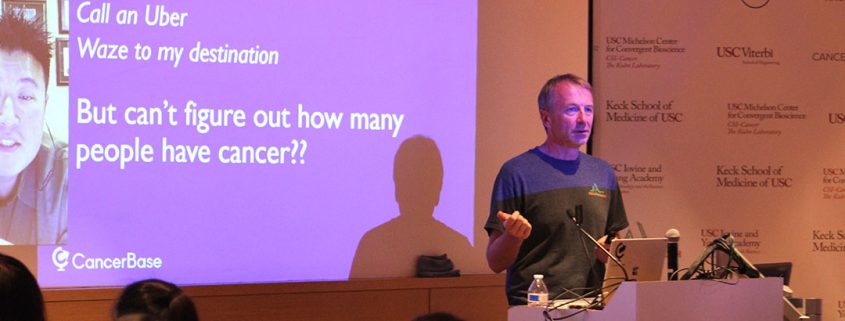Hack for Health connects across disciplines
Six months ago, Thuy Truong was diagnosed with cancer.
Two months after her diagnosis, Truong, a USC alumna, met Peter Kuhn, a founding faculty member of the USC Michelson Center for Convergent Bioscience. By applying her 10-year background in computer science, Truong began working on projects aimed at raising the quality of life for cancer patients.
“We had two projects, and we were working on them for two years,” Truong said. “Now, we thought, ‘Let’s have 20 projects happen in one weekend.”
That was the inspiration behind Hack for Health, a hackathon designed to foster innovation in cancer treatments.
Truong worked with Jorge Nieva, her physician and an associate professor of clinical medicine at the Keck School of Medicine, to design the event.
“I convinced [Nieva] to do a hackathon together,” Truong said. “This is because I want to find some way to improve the quality of life. I want to have more people pay attention to cancer and I want to cure the disease a lot faster.”
The weekend-long hackathon from April 7 to 9 connected physicians, cancer survivors and coders to students from diverse disciplines. In teams of five people or fewer, the students were challenged to create projects aimed at solving a problem that cancer patients face through technology and programming.
Each student from the top three teams was awarded a prize of $3,000 and automatic acceptance to the program hosted by the Bridge Institute, a summer-intensive program hosted by the Dornsife College of Letters, Arts and Sciences that provides students with mentorship and support to develop the final project produced at Hack for Health.
The interdisciplinary approach to solving cancer is not far-fetched. According to Nieva, cancer is just as much of a data problem as it is a biological problem.
“You can imagine that if you are a cancer patient trying to figure out your own stage, it’s kind of hard,” Nieva said, addressing the students at the opening ceremony. “So, [for] someone who isn’t good at looking at data, that can be a hard thing to actually do.”
The high demand for streamlined technology working to solve cancer, Nieva said, is due to the infinite different forms of the disease, which scientists in different fields must work together to solve.
“[Biology is] not important to you,” Nieva said. “What’s important to you is that this is all a data problem. I need you people to solve the data problem because frankly, I don’t know how to do it.”
Although the ultimate goal is to find a cure for cancer, most students looked to simplify the treatment process. After speaking to a mentor, who was also a cancer survivor at the event, one team decided to build a prediction tool and a timeline that tracks the effectiveness of drug therapy.
“We had a cancer patient tell us that she took so many drugs that when the doctor asked her what kind of drugs she took and when she took them, she couldn’t remember,” said Edward Hu, a sophomore majoring in computer science. “We’re building a timeline, a nice way for the doctor or you to see where you started your drug and where you ended your drug.”
Other teams’ creations included a chemotherapy calendar for patients, a match program for clinical trials and tools aiming to strengthen mental health of cancer patients.
Another problem cancer patients face, Nieva added, is their aspiration to preserve their legacies. People want to tell their stories, and they want to tell things to their children and grandchildren.
“Few of them know the elements of storytelling,” Nieva said. “And I know people here at USC know the elements of storytelling. That has nothing to do with curing cancer, but it has everything to do with life.”
Through collaboration with cancer survivors during meal breaks and Saturday’s Yoga with Cancer Patients module, students were able to apply real-life circumstances to their coding projects.
Apoorva Dhakras, a master’s student studying computer science, believes the impact of the event stems from its real-world application.
“We have done a lot of theoretical stuff in the master’s,” Dhakras said. “We have learned how things work, but this would be a good platform to actually implement things and build something that will make a difference.”
Dhakras’ teammate, Disha Parek, also a master’s student studying computer science, chose to participate in Hack for Health for its narrow focus and mission.
“It’s about someone’s life,” Parek said. “Technology can help in some way or the other. I’m working on technology, but something where I can touch lives and make something out of it.”

